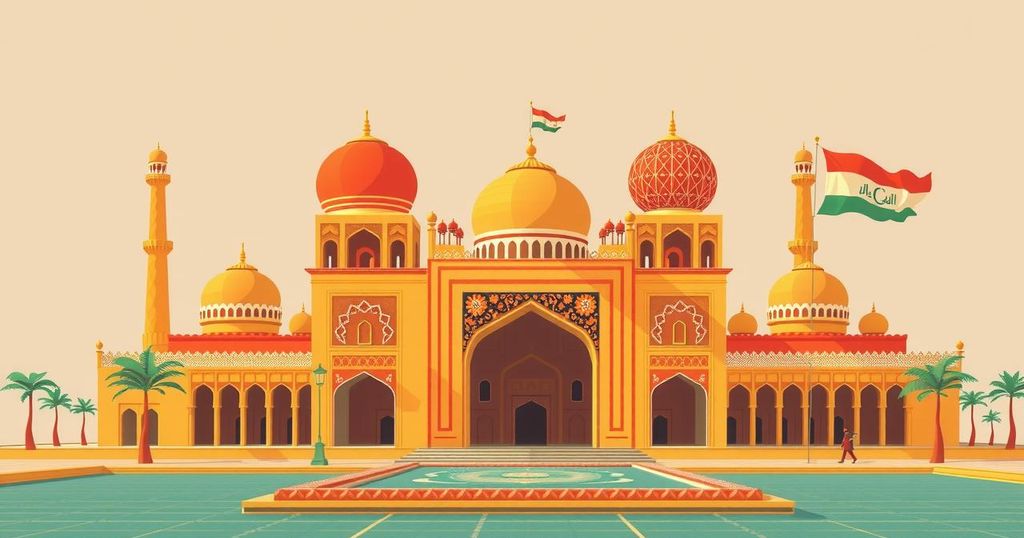Iraq’s Invitation to Syrian President Al-Sharaa Sparks Political Turmoil

Baghdad’s invitation to Syrian President Ahmad al-Sharaa for an upcoming Arab League summit has led to significant political divisions within Iraq. While some see it as a diplomatic opportunity, others raise concerns over al-Sharaa’s past as a militant and connections to the controversial Assad regime. Shiite factions express strong opposition, highlighting ongoing sectarian tensions in Iraq’s political system.
The recent formal invitation extended to Syrian President Ahmad al-Sharaa by Baghdad to attend the Arab League summit has ignited significant political discord within Iraq. Having assumed the presidency following a successful rebel offensive against former leader Bashar Assad, al-Sharaa strives to rebuild his nation post-civil war. However, his history as a Sunni Islamist militant raises concerns among various Iraqi factions, particularly Shiite groups.
Previously known as Abu Mohammed al-Golani, al-Sharaa participated in al-Qaida insurgencies against U.S. forces after the 2003 invasion and currently faces a terrorism-related arrest warrant in Iraq. Prime Minister Mohammed Shia Al-Sudani confirmed the official invitation for al-Sharaa to attend the May 17 summit after a discreet meeting in Qatar, although the Syrian President has not yet indicated his attendance.
Iraq aims to establish itself as a mediator in regional conflicts, having previously facilitated dialogue between rivals Iran and Saudi Arabia. This invitation to al-Sharaa is seen by some Iraqi officials as a means to enhance Baghdad’s image as a center for diplomatic negotiations.
However, opposition is strong from influential Shiite factions in alliance with Iran, who view al-Sharaa as a figure of contention due to his affiliation with the Assad regime during the Syrian civil war. Prominent factions contend that his participation would undermine Iraq’s sovereignty and disregard victims of past violence.
Several political leaders, such as Mustafa Sand, highlighted concerns over the warrant against al-Sharaa, stating that it must be verified by the appropriate judicial authorities. Statements from other factions like the Islamic Dawa Party emphasize the necessity for summit participants to maintain a clean legal history.
Contrarily, Sunni political figures advocate for al-Sharaa’s inclusion in the summit, arguing that rebuffing his presence would signal a lack of progress towards national unity. They view this as an opportunity to build relations with Syria’s new leadership.
Although the arrest warrant may not impede al-Sharaa’s participation, the incident underscores profound rifts within Iraq’s political landscape and the ongoing challenges toward national reconciliation. Analysts warn that this situation may exacerbate sectarian strife while calling attention to the differing perspectives on al-Sharaa’s role in regional politics. Furthermore, observers point out the potential for increased tensions as perspectives remain polarized on the invitation.
In summary, the contrasting views surrounding Ahmad al-Sharaa’s upcoming invitation to the summit reflect the intricate and often fraught dynamics present within Iraqi politics, as well as the larger implications for regional diplomacy.
Ultimately, this situation illustrates the delicate balance Iraq must maintain amidst its complex relationships with both Sunni and Shiite factions, while navigating its aspirations for enhanced regional engagement and stability.
The invitation of Syrian President Ahmad al-Sharaa to the Arab League summit has raised alarm among various Iraqi political factions, highlighting the ongoing divisions within Iraq regarding issues of sovereignty and reconciliation. While some factions see al-Sharaa’s potential participation as an opportunity for diplomacy, others strongly oppose it due to his controversial past. This development serves as a reflection of the broader sectarian tensions in Iraq and the challenges faced in forging a unified political identity in the region.
Original Source: www.usnews.com








